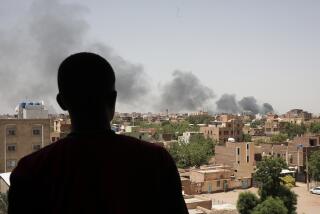U.S. Troops Sliding Into Mission to Keep Peace
- Share via
WASHINGTON — Escalating armed conflict between Afghan factions is drawing the U.S. military deeper into the peacekeeping role that the Bush administration has long vowed to avoid.
From the beginning of the war, President Bush has declared that U.S. troops were in Afghanistan on a short-term assignment to root out terrorism and would not act as constables or “nation-builders.” But as factional tensions have sharpened, U.S. troops have intervened repeatedly to prevent fighting or to halt it once it started.
Air Force Gen. Richard B. Myers, chairman of the Joint Chiefs of Staff, said in an interview this week that U.S. Army Special Forces soldiers had already taken action in more than 10 incidents to “keep peace within the family.”
It remains unclear whether U.S. troops would be inserted into any major inter-Afghan battles that risked sizable American casualties. Yet U.S. officials concede that mediating conflicts between rival warlords or groups is now one of the many roles the troops have taken on to help ensure security as Afghanistan seeks to end decades of war.
“We’ll continue to use our Special Forces and civil affairs teams with local commanders on the ground to try to deal with contentious issues and to discourage conflict among them,” State Department spokesman Richard Boucher said Wednesday.
Officials of allied countries and private Western groups in Afghanistan say they believe that, like it or not, the U.S. troops have become the security force of last resort.
“In effect, they will be the peacekeepers,” said a senior Western diplomat who spoke on condition of anonymity. “Why not admit it?”
The expansion of the U.S. troops’ role raises new questions about how long they will be tied up in Afghanistan and whether the commitment could interfere with possible plans for a military campaign against Iraq.
U.S. officials intend to turn over the job of ensuring security to the Afghan army, which the Americans have begun to train. But by the U.S. military’s own estimates, it may be two years before that army is capable of quelling fights between Afghanistan’s quarrelsome factions.
Meanwhile, U.S. officials say they believe that the presence of about 5,000 heavily armed American troops in Afghanistan is helping to deter fighting. But in some cases, warlords have taken up arms, and U.S. troops have had to intervene.
Mark Schneider, senior vice president of the International Crisis Group, a Brussels-based think tank that has been active in Afghanistan, said the United States “will be the default security guarantor, at least in the interim,” until a national army is established.
He predicted that this period of U.S. obligation “will get longer and longer,” despite Washington’s intentions of turning the job over to the Afghans.
The internal armed conflicts have been concentrated in northern Afghanistan, near the city of Mazar-i-Sharif, and in the east, near Jalalabad, U.S. officials and private experts say.
Few details of the U.S. military’s role in these incidents were available. But in February, U.S. troops intervened between two rival forces who were fighting south of Mazar-i-Sharif.
As an interim government has struggled to extend its authority outside the capital, Kabul, these tribal leaders and other militia commanders have tried to maintain their influence over key sections of the country.
Also threatening peace is friction between Pushtuns, the largest ethnic group in Afghanistan, and other groups. Violence in the north has been driving Pushtuns toward the southern part of the country, which they dominate.
The U.S. role in keeping the peace has become clearer in recent days, as allied officials have rejected the idea of broadening the international peacekeeping force that is now patrolling Kabul.
Though some Bush administration officials favored the idea of expanding the international force to other cities, others feared that the U.S. obligation to help protect such a force could interfere with the primary mission of destroying the remnants of Al Qaeda and Taliban fighters.
U.S. officials have committed themselves to helping out the existing international force if it comes under fire.
Bush and his aides have stressed since his 2000 presidential campaign that they do not believe that U.S. combat troops should be posted to keep the peace in missions such as the one that the Clinton administration began in the Balkans in 1995. They have argued that combat troops are poorly suited for such a role and that local forces, or other countries, should take on such tasks.
But the issue is especially difficult in Afghanistan, since the United States does not want to risk another collapse that would allow the country to become a haven for Islamic militants intent on destroying America.
Gary J. Schmitt, executive director of the pro-defense group Project for a New American Century, said he believes that if civil upheaval threatened the new order in Afghanistan, the Bush administration would decide that it had to get involved.
Completely pulling out of Afghanistan instead would not only allow the Al Qaeda terrorist network to reestablish itself, but would also send a signal that the United States doesn’t care about the region’s long-term stability, he said. Such a move would raise doubts among Arab countries that are being courted as U.S. allies against Iraqi President Saddam Hussein but worry that his ouster would trigger instability beyond Iraq.
Ivo Daalder, a Brookings Institution fellow and former Clinton national security aide, said he fears that the Bush administration might try to sit out a fight and later build ties with the winner.
If the current Afghan leadership were ousted, the U.S. might “just side with the next government, because the alternative could be to be embroiled in a long civil war,” he said. “They’re too afraid of another Vietnam.”
Times staff writer John Hendren contributed to this report.
More to Read
Sign up for Essential California
The most important California stories and recommendations in your inbox every morning.
You may occasionally receive promotional content from the Los Angeles Times.













